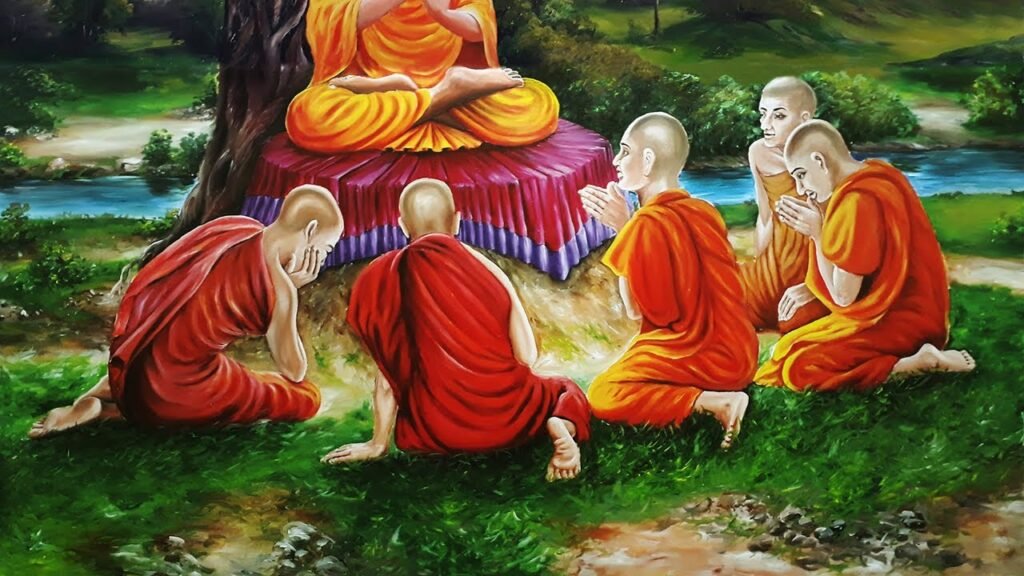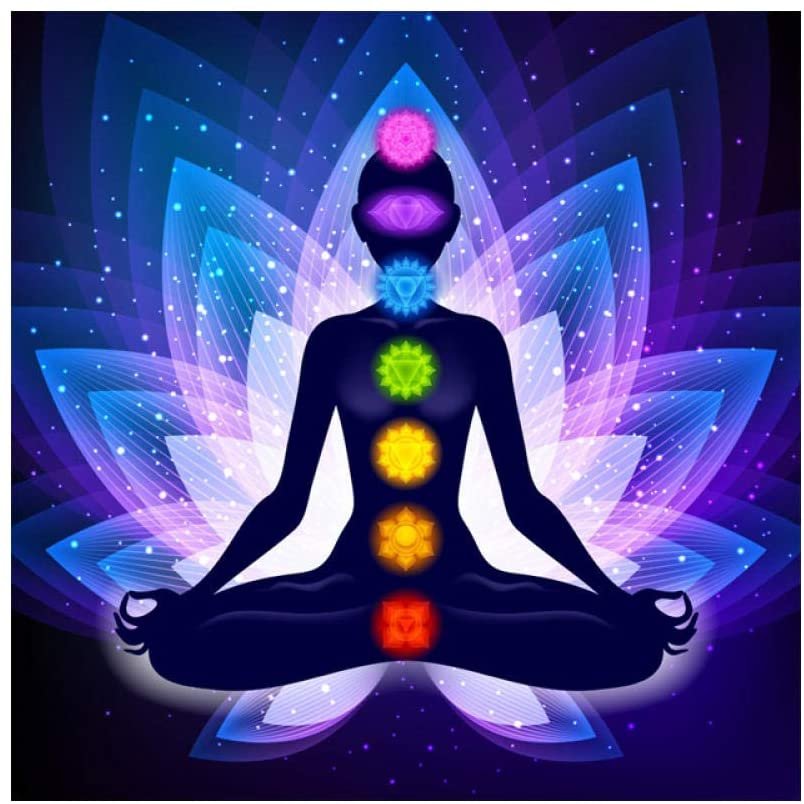Meditation is an adventure, adventure into the unknown, the greatest
adventure the human mind can take.
Meditation is just to be, not doing anything—no action, no thought, no
emotion. You just are and it is a sheer delight. From where does this
delight come when you are not doing anything? It comes from nowhere,
or it comes from everywhere. It is uncaused, because existence is made of
the stuff called joy.
When you are not doing anything at all—bodily, mentally, on no level—when all activity has ceased and you simply are, just being, that’s what meditation is. You cannot do it, you cannot practice it: you have only to understand it. Whenever you can find time for just being, drop all doing. Thinking is also doing, concentration is also doing, contemplation is also doing. Even if for a single moment you are not doing anything and you are just at your center, utterly relaxed—that is meditation. And once you have got the knack of it, you can remain in that state as long as you want; finally you can remain in that state for twenty-four hours a day. Once you have become aware of the way your being can remain undisturbed, then slowly you can start doing things, keeping alert that your being is not stirred. That is the second part of meditation—first, learning how just to be, and then learning little actions: cleaning the floor, taking a shower, but keeping yourself centered. Then you can do complicated things. For example, I am speaking to you, but my meditation is not disturbed. I can go on speaking, but at my very center there is not even a ripple; it is just silent, utterly silent. So meditation is not against action. It is not that you have to escape from life. It simply teaches you a new way of life: you become the center of the cyclone. Your life goes on, it goes on really more intensely—with more joy, with more clarity, more vision, more creativity—yet you are aloof, just a watcher on more clarity, more vision, more creativity—yet you are aloof, just a watcher on the hills, simply seeing all that is happening around you. You are not the doer, you are the watcher. That’s the whole secret of meditation, that you become the watcher. Doing continues on its own level, there is no problem: chopping wood, drawing water from the well. You can do small and big things; only one thing is not allowed and that is, your centering should not be lost. That awareness, that watchfulness, should remain absolutely unclouded, undisturbed.

In Judaism there is a rebellious school of mystery called Hassidism. Its founder, Baal Shem, was a rare being. In the middle of the night he was coming from the river—that was his routine, because at the river in the night it was absolutely calm and quiet. And he used to simply sit there, doing nothing—just watching his own self, watching the watcher. This night when he was coming back, he passed a rich man’s house and the watchman was standing by the door. And the watchman was puzzled because every night at exactly this time, this man would come back. He came out and he said, “Forgive me for interrupting but I cannot contain my curiosity any more. You are haunting me day and night, every day. What is your business? Why do you go to the river? Many times I have followed you, and there is nothing—you simply sit there for hours, and in the middle of the night you come back.” Baal Shem said, “I know that you have followed me many times, because the night is so silent I can hear your footsteps. And I know every day you are hiding behind the gate. But it is not only that you are curious about me, I am also curious about you. What is your business?” He said, “My business? I am a simple watchman.” Baal Shem said, “My God, you have given me the key word. This is my business too!” The watchman said, “But I don’t understand. If you are a watchman you should be watching some house, some palace. What are you watching there, sitting in the sand?” Baal Shem said, “There is a little difference: you are watching for somebody outside who may enter the palace; I simply watch this watcher. Who is this watcher? This is my whole life’s effort; I watch myself.” The watchman said, “But this is a strange business. Who is going to pay you?” He said, “It is such bliss, such a joy, such immense benediction, it pays itself profoundly. Just a single moment, and all the treasures are nothing in profoundly. Just a single moment, and all the treasures are nothing in comparison to it.” The watchman said, “This is strange. I have been watching my whole life. I never came across such a beautiful experience. Tomorrow night I am coming with you. Just teach me. Because I know how to watch—it seems only a different direction is needed; you are watching in some different direction.”
There is only one step, and that step is of direction, of dimension. Either we can be focused outside or we can close our eyes to the outside and let our whole consciousness be centered inwards—and you will know, because you are a knower, you are awareness. You have never lost it. You simply got your awareness entangled in a thousand and one things. Withdraw your awareness from everywhere and just let it rest within yourself, and you have arrived home. The essential core, the spirit of meditation is to learn how to witness. A crow crowing…you are listening. These are two—object and subject. But
can’t you see a witness who is seeing both?—the crow, the listener, and still there is someone who is watching both. It is such a simple phenomenon. You are seeing a tree: you are there, the tree is there, but can’t you find one thing more?—that you are seeing the tree, that there is a witness in you which is seeing you seeing the tree. § Watching is meditation. What you watch is irrelevant. You can watch the trees, you can watch the river, you can watch the clouds, you can watch children playing around. Watching is meditation. What you watch is not the point; the object is not the point. The quality of observation, the quality of being aware and alert—that’s what meditation is. Remember one thing: meditation means awareness. Whatsoever you do with awareness is meditation. Action is not the question, but the quality that you bring to your action. Walking can be a meditation if you walk alert. Sitting can be a
meditation if you sit alert. Listening to the birds can be a meditation if you listen with awareness. Just listening to the inner noise of your mind can be a meditation if you remain alert and watchful. The whole point is, one should not move in sleep. Then whatsoever you do is meditation.
THE FIRST STEP IN AWARENESS is to be very watchful of your body. Slowly, slowly one becomes alert about each gesture, each movement. And as you become aware, a miracle starts happening: many things that you used to do before simply disappear; your body becomes more relaxed, your body becomes more attuned. A deep peace starts prevailing even in your body, a subtle music pulsates in your body. Then start becoming aware of your thoughts; the same has to be done with thoughts. They are more subtle than the body and, of course, more dangerous too. And when you become aware of your thoughts, you will be surprised what goes on inside you. If you write down whatsoever is going on at any moment,
you are in for a great surprise. You will not believe that this is what is going on inside you.

And after ten minutes read it—you will see a mad mind inside! Because we are not aware, this whole madness goes on running like an undercurrent. It affects whatsoever you are doing, it affects whatsoever you are not doing; it affects everything. And the sum total of it is going to be your life! So this madman has to be changed. And the miracle of awareness is that you need not do anything except just become aware.
The very phenomenon of watching it changes it. Slowly, slowly the madman disappears; slowly, slowly the thoughts start falling into a certain pattern; their chaos is no more, they become more of a cosmos. And then again, a deeper peace prevails. And when your body and your mind are at peace you will see that they are attuned to each other too, there is a bridge. Now they are not running in different directions, they are not riding different horses. For the first time there is accord, and that accord helps immensely to work on the third step —that is, becoming aware of your feelings, emotions, moods. That is the subtlest layer and the most difficult, but if you can be aware of the thoughts then it is just one step more. A little more intense awareness is needed and you start reflecting your moods, your emotions, your feelings.
Once you are aware of all these three they all become joined into one phenomenon. And when all these three are one—functioning together perfectly, humming together, you can feel the music of all the three; they have become an orchestra —then the fourth happens, which you cannot do. It happens on its own accord. It is a gift from the whole, it is a reward for those who have done these three. And the fourth is the ultimate awareness that makes one awakened. One becomes aware of one’s awareness—that is the fourth. That makes a buddha, the awakened. And only in that awakening does one come to know what bliss is.
The body knows pleasure, the mind knows happiness, the heart knows joy, the fourth knows bliss. Bliss is the goal of sannyas, of being a seeker, and awareness is the path towards it. § The important thing is that you are watchful, that you have not forgotten to watch, that you are watching…watching…watching. And slowly, slowly, as the watcher becomes more and more solid, stable, unwavering, a transformation happens. The things that you were watching disappear.

After reading your article, it reminded me of some things about gate io that I studied before. The content is similar to yours, but your thinking is very special, which gave me a different idea. Thank you. But I still have some questions I want to ask you, I will always pay attention. Thanks.
Can laughing meditation be effective for individuals dealing with chronic pain?